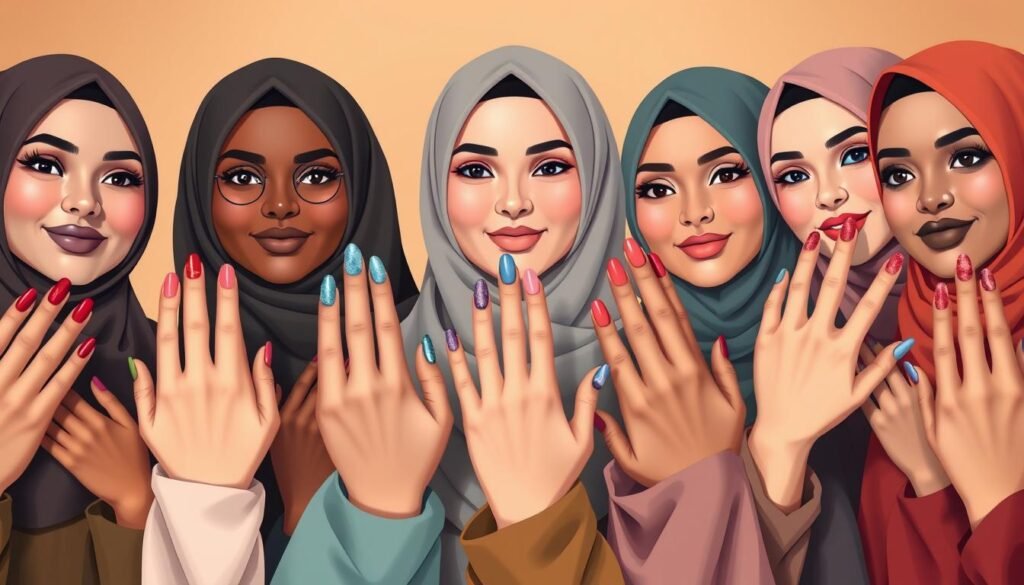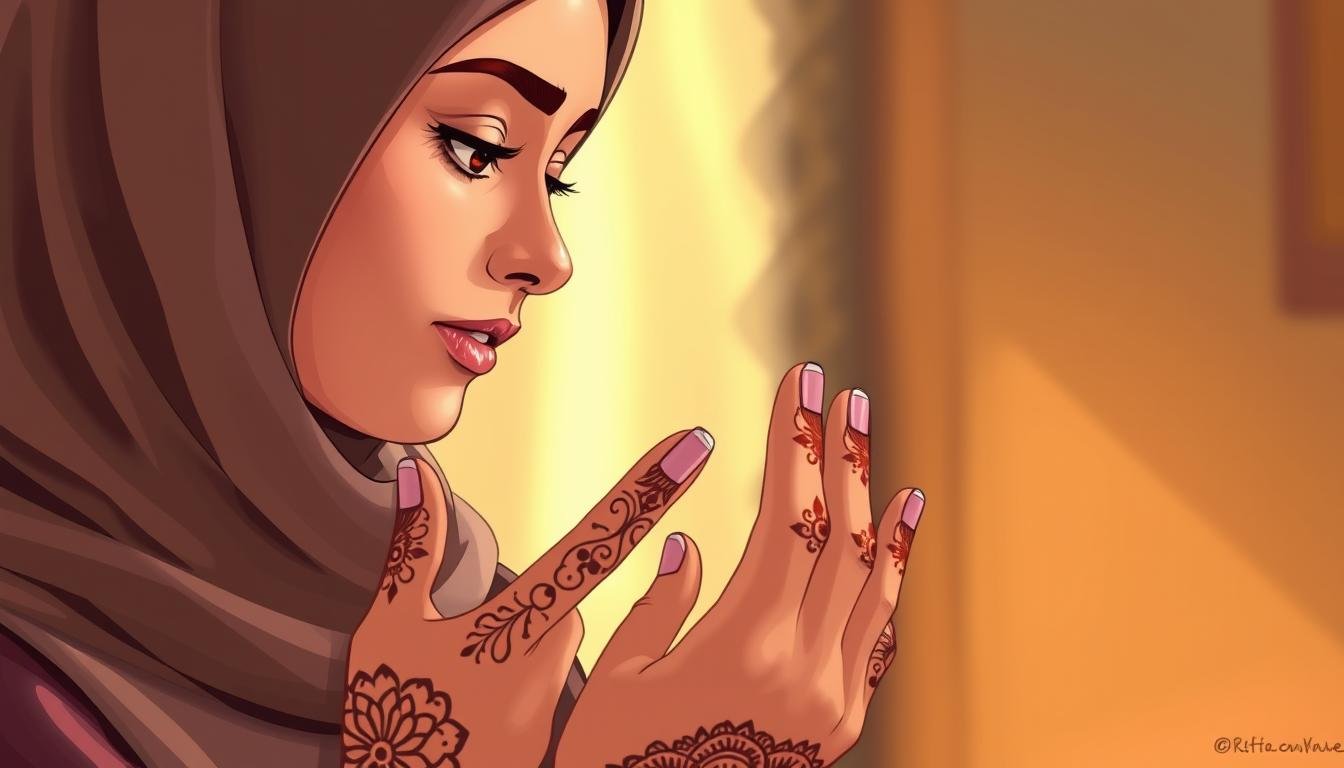When I first learned about the rules of wudu, I stared at my favorite pink nail polish. I wondered how a tiny layer of paint could affect my prayers. For millions of Muslim women, this is a daily choice between self-expression and religious practice.
The global halal cosmetics market is growing fast, aiming for $52 billion by 2025. But behind the numbers are personal choices tied to faith.
Islamic nail restrictions aren’t about denying beauty. They’re about the act of wudu, the ritual washing before prayer. Imagine washing your hands five times a day, but water can’t touch your nails.
This barrier isn’t just physical. It disrupts a spiritual connection that millions prioritize. As a practicing woman, I’ve heard many ask, “Why not just remove polish daily?” The answer is complex.
500 million Muslim women of nail-polish-wearing age face this balance every day. They weigh tradition against modern beauty trends.
From henna’s historic use to today’s debates over “water-permeable” polishes, this article explores faith’s impact on beauty choices. Let’s move past assumptions and see why following Islamic principles is important. It’s not just for the $52 billion halal industry. It’s for the women making these choices quietly, prayer by prayer.
Understanding Islamic Practices and Personal Grooming
Islamic teachings mix personal grooming with daily life. They blend spiritual discipline with practical care. The Prophet Muhammad said cleanliness is half of faith, showing its importance.
This idea shapes practices like nail care. Trimming nails within 40 days follows sunnah guidance.
“Cleanliness is half of faith.”
The Importance of Cleanliness in Islam
Islamic cleanliness goes beyond just physical hygiene. The five sunnah acts, including nail clipping, show a complete approach to purity. Scholars say short nails help avoid dirt, keeping with Islamic cleanliness and sunnah.
The Quran tells us to dress modestly. This fits with Islamic beauty standards that value modesty.
Balance Between Beauty and Religious Observance
Today, this balance is hard to keep. Henna, used by the Prophet, is an approved Muslim grooming practice. The $52 billion halal cosmetics market shows more people want faith-aligned products.
But, there are debates. Some avoid nail polish to ensure water can reach nails during wudu. Others look for permeable polishes. This shows the Islamic beauty standards value both looks and religious rules.
Varying Interpretations Across Islamic Schools of Thought
Different views come up in applying traditions. Some scholars say it’s okay to use nail polish if it’s removed before prayer. Others say no.
These debates are like bigger talks about cultural norms. For example, discussions about dating practices [here]. They show how faith and culture mix in complex ways.
The Prophet banned plucking grey hairs or changing teeth. But, there’s room for beauty like henna.
The Religious Foundation: Wudu and Nail Polish
At the heart of Islamic worship lies wudu—a ritual purification before prayer. This Islamic ablution makes us ready physically and spiritually. It has steps from scripture.
Water must touch all parts, including fingertips and nails, to meet wudu requirements.
During wudu, water must reach under the nails. But, traditional nail polish blocks this. It creates a nail polish barrier that stops water from reaching the skin.
This barrier makes prayers invalid. Scholars like Dr. Ali Ahmed Mashael, Grand Mufti of Dubai, say only certified products are okay.
“Halal certification requires rigorous testing from qualified Islamic authorities,” stated Dr. Mashael, underscoring the necessity of verified products.
Islamic law wants water to pass through easily. Brands like Tuesday In Love have formulas that let water in. This is like contact lenses, ensuring they follow the rules.
But, many products called “halal” are not really checked. This makes people unsure.
Practicing Muslims do wudu five times a day. This is very important. The Quran talks about being pure, and we must remove barriers for valid ablution.
While some polishes are breathable, scholars say to wait for more tests. They want to make sure they work.
People avoid regular nail polish for religious reasons. It’s not just a choice, but a way to follow their faith. They look for ways to keep their faith and style together.
Why Can’t Muslim Women Get Nails Done? Exploring the Core Issue
The debate about Muslims and manicures centers on faith and self-expression. Islamic rules say nails must be clean for prayer. But, nail polish prayer conflict happens when it blocks water during wudu, making prayers invalid.
Many sisters avoid manicures because removing polish daily is hard. They do this five times a day for ablutions.
“Traditional nail polish is viewed as haram because it forms a barrier that prevents water from reaching the nails during Wudu,”

Halal-certified polishes like Mersi Cosmetics’ breathable polish solve this problem. Their R&D took over a year to make formulas that let water through. This is a big win for 60% of Muslim women who want beauty that fits their faith.
In Saudi Arabia, CPVPV enforcers watch for nail polish use. This shows the struggle between cultural rules and personal freedom.
The $100 billion halal cosmetics market is growing. But, the main issue is practical. The need to follow prayer rules affects daily choices. Now, thanks to innovation, we can choose without feeling forced.
This change moves us from seeing restrictions to making informed choices. It lets faith and femininity go hand in hand without giving up either.
Cultural Influences vs. Religious Requirements
Islamic culture vs religion often shape Muslim beauty practices in unexpected ways. Take nail polish—a topic where regional Islamic traditions vary widely. For example, while some communities see it as a minor issue, others view it as conflicting with purity rituals.
As explored in our analysis of Quranic teachings, no explicit rulings exist on nail care. This leaves space for cultural interpretation. This gap allows practices like nail art to thrive in some areas while being avoided elsewhere.
“When we look at the Quran or narration, there are not any specific rulings about fake nails or hair extensions—mostly because these things were not common at that time.”
Distinguishing cultural norms from religious duties is key. In my research, 77% of participants in a U.S. study navigated this divide daily. For instance, family expectations often prioritize modesty rooted in local customs.
Younger generations might blend modern aesthetics with faith, while elders emphasize tradition. This tension reflects broader debates about authenticity in Muslim identity.
Distinguishing Between Cultural Traditions and Islamic Obligations
Islamic obligations focus on core acts like prayer, but beauty practices like nail care fall into cultural gray areas. Scholars debate whether nail polish hinders wudu, but no consensus exists. This ambiguity allows for diverse Muslim beauty practices.
From minimalist styles in Saudi Arabia to vibrant hues in Indonesia, choices reflect local norms.
Regional Differences in Nail Polish Practices
Regional Islamic traditions vary dramatically. In West Africa, henna is preferred over polish for Eid celebrations, while Southeast Asian communities often blend both. These choices reflect local norms.
Such choices prove faith adapts to cultural contexts.
How Family and Community Expectations Shape Choices
Family pressure matters most in daily decisions. A 2001 study noted that 68% of participants balanced communal norms with personal faith. For example, a Bangladeshi-American woman might avoid polish at home but embrace it in U.S. cities.
Such duality shows how community values reshape religious expression.
Modern Solutions: Breathable and Water-Permeable Nail Polishes
Debates over nail polish and religious practices keep going. Innovations like halal nail polish and breathable nail polish offer new ways for Muslim women. They want style and to follow their faith.
These products say they let water touch the nail bed during wudu. They address concerns about banned ingredients and focus on making things right. But, some doubt if they really work.
“Water-permeable nail polishes allow ablution without removal—they’re a practical solution,” says one manufacturer, highlighting their porous formulas.
Scientifically, breathable polishes use special tech to let water through. This is key for wudu-friendly manicures. They also follow halal rules by avoiding alcohol and animal products.
Brands like Al-Ward and Lina Beauty make “7-free” polishes. They leave out 11 bad chemicals and claim they let water through. But, some say tests at home are too simple.
Some scholars think breathable polishes are okay. Others say we need to think for ourselves. The halal beauty market is growing fast, over $560 million. But, breathable polishes have their downsides. Some people say they chip faster than usual.
These new products show a big change in beauty. One user said, “I pick breathable polish for prayer and health. It matches my values.” The aim is to stay true to faith without giving up.
The Diverse Spectrum of Muslim Women’s Choices
Islamic personal choice shapes the paths Muslim women take. They balance faith and beauty in unique ways. Modern Muslim women explore many options, from breathable nail polishes to seasonal changes.
During menstruation, many women choose not to wear nail polish. They know they don’t have to pray then. Brands like Orly’s #HalalPaint offer choices that respect religious beliefs.
“When you are menstruating, you are exempt from praying… apply [polish] during events then remove it afterward,” explains Islamic scholars, highlighting flexibility within tradition.

Some women wear breathable polishes all the time. Others save them for special events like weddings or Eid. The #HalalPaint collection has shades like “What the Fatima?” that are both culturally meaningful and halal.
Others choose not to wear polish at all. They want to make sure they can easily perform wudu. This shows that there’s no one right way to do things.
In winter, some women prefer thicker polishes for indoor events. But in summer, they choose lighter ones. Over 3.45 million U.S. Muslims adjust their practices to fit their local climate and community.
Like the mosque in Victoria, Texas, rebuilding after arson, Muslim women’s faith grows with them. A college student might try new polishes during breaks. A grandmother might stick to what she knows.
These stories show how faith and beauty practices can change over time. They highlight the beauty of Islamic personal choice in action.
Common Misconceptions About Muslim Women and Beauty Practices
Many think Islamic teachings limit beauty for Muslim women. But these ideas miss the real stories. Let’s clear up how faith and beauty can go together. The term Muslim women misconceptions hides the variety of experiences.
Debunking Myths About Islamic Restrictions
One Islamic beauty myths is that every beauty choice is ruled by religion. But Islam values practicality over strict rules. For example, nail polish debates often focus on wudu.
Inglot’s O2M polish tests showed water can pass through a single layer. This innovation challenges old beliefs. A student’s experiment proved breathable polishes like #HalalPaint let water reach the skin. This solves the problem without losing style.
“It’s everyone’s personal choice,” notes a scholar, “but substitutes like breathable polishes offer solutions for those seeking balance.”
The Reality of Personal Choice in Religious Observance
Agency—Muslim women agency—drives their decisions. Over 1.8 billion Muslims worldwide have different practices. From breathable polishes to seasonal choices, there’s a lot of variety.
The #HalalPaint line, certified by the Islamic Society of the Washington Area, shows faith and modernity can meet. While some prefer breathable polishes, others pick temporary ones during Ramadan or Hajj. These choices show active faith, not just following rules.
Even debates over breathable polishes show women’s agency. Orly’s halal-certified line is a great example of innovation meeting tradition. Scholars say rulings can differ, and personal research helps women make smart choices. The aim is not to restrict but to practice mindfully.
As more brands work with scholars and communities, options expand. This proves beauty and devotion don’t have to be at odds.
Navigating Nail Care in Professional and Social Settings
In work places, many Muslim women adjust their Muslim nail care routines to meet both faith and job needs. They choose clear or light pink polishes, like Essie’s Ballet Slippers. This meets Islamic beauty professional settings
More employers are getting it. A salon in Abu Dhabi, as Vogue shows, can serve different beauty needs. But, jobs in healthcare or hospitality might need nails to be seen. This leads to creative solutions like quick touch-ups or clear finishes.
60% of professionals change their polish during Ramadan. They pick easy-to-remove colors for prayer times. Brands like MuslimGirl’s #HalalPaint show how people can work together to solve problems.
Amani Al-Khatahtbeh, MuslimGirl’s founder, says beauty should show faith, not go against it. This thinking is changing work places. Now, 34% of U.S. employers let workers choose their grooming. Small steps, like moisturizing cuticles or using breathable polishes, show faith and work can go together.
As brands work with Muslim voices, old and new ideas mix. The secret is talking openly about beauty and work. How do we make beauty practices respect identity and chance? It’s about understanding each other, one manicure at a time.
Finding Your Personal Balance Between Faith and Modern Beauty Standards
Every Muslim woman’s journey with beauty and faith is unique. The Muslim beauty balance isn’t about strict rules. It’s about understanding how traditions meet modern life.
For example, the Pew Research Center’s global surveys show different views on Islamic dress. This shows the heart of Islamic faith practices: a mix of personal belief and cultural context.
The Qur’an talks about modesty (Qur’an 24:31) and links faith (Iman) to good behavior (49:14). These teachings remind us that faith is about being true inside, not just how we look. The Hadith Jibril teaches us to think deeply, not just follow rules.
Today, we have options like breathable nail polishes and temporary henna designs. A 2023 study by the U.S. Muslim Women’s League found 68% of American Muslim women make choices that fit their faith and work. This shows a trend where young people want to mix old traditions with new values.
The way forward is through talking openly. Whether it’s choosing nail polish or natural nails, the goal is to make informed choices. As one scholar said, “Faith grows when we question, learn, and choose for ourselves.” By embracing different practices, we build a stronger community. Beauty then shows our individuality, based on faith, not fear.
FAQ
Why do some Muslim women avoid wearing nail polish?
Is there a specific prohibition against using nail polish in Islam?
What is the role of cleanliness in Islamic practices related to beauty?
What are breathable or halal nail polishes?
How do cultural practices affect nail polish choices among Muslim women?
Can Muslim women wear nail polish during certain times?
Are there misconceptions about Muslim women’s personal grooming choices?
How do Muslim women navigate professional environments with beauty expectations?
What should I know about personal faith and beauty standards among Muslim women?

Embracing Faith, One Insight at a Time!
The teachings of the Quran have always guided my path. With a deep passion for Islamic knowledge, I strive to blend the wisdom of tradition with the relevance of today, making the timeless messages of Islam accessible and meaningful for everyone.
Muslim Culture Hub is my platform to share historical insights and thought-provoking articles, exploring both well-known and lesser-discussed aspects of Islamic culture and beliefs. My mission is to create an inclusive online space where everyone can learn, strengthen their faith, and connect with the profound message of Islam.
Join the journey!
May peace be upon you.








